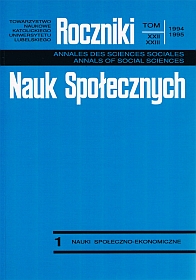Demokracja pod rządami prawa. Przegłąd doświadczeń
Abstrakt
The paper seeks to answer, from the perspective of the sociologist, to what extent four years after the Round Table talks the Polish system may legitimately be defined as democracy under the law. It presents the dynamic process of the system changes, both institutional and personal, in the period from the mid 1989 to the mid 1993. In view of these changes the paper distinguishes four successive stages which vary according to the type of relation between the main actors of the political stage: 1) the stage of the supremacy of the contractual Sejm over the elected president which it had elected, 2) the stage of unbalance between the president elected democratically in general election and the contractual Sejm, 3) the stage of unbalance between the democratically elected president and the democratically elected Sejm, and 4) the stage of the supremacy of the president over the Sejm.
The author emphasizes the role of three institutions: the Constitutional Tribunal, the Spokesman of Citizens’ Rights, and the Highest Chamber of Control. These institutions, in fact, were established in the previous period, but they play a principal role in the forming of the elements of the reign of the law in the new regime.
The author mentions a progressive plurality in opinions and points at the three basic normative orientations in Poles: liberal, oriented at the individual rights and freedom; fundamentalist, stressing the traditional values of national culture; and social, which is expressed in the tendency towards executing from the authorities the social and economic rights. Basing himself on his own research of the years 1988 and 1992 the author concludes that the individual and liberal attitudes as well as little decrease in the rate of those expecting general welfare from the state still exist. At the same time people expect from the state a guarantee of the social minimum and employment.
The author states that Polish farmers, workers of state enterprises and the workers of the budget sphere, and also the class of businessmen under formation, from various reasons still act for the sake of the State control of economy in the measure that is most convenient for them. Due to these pressures, though there are other reasons as well, the public administration plays a more and more important role in the process of the system transformation. The author presents a still strong position of Trade Unions and the Church in the public life of Poland. 1992 findings point out that the majority of Poles (68%) opt for a total separation between the State and the matters of religion. According to them it is political parties (65%), country entrepreneurs (43%), trade unions (41%) and common people (43%) that should influence what is going on in Poland.
Claiming that Poland is indeed a democratic legal State (democratically elected parliament, the law formed in a democratic manner, the principle of equality towards the law, the right of individuals to an individual complaint to the European authorities, since Poland has ratified the European Convention of Human Rights). The author points at the threats which lie here, among which he quotes the weakness of the Polish middle class as the most important one.
Copyright (c) 1995 Roczniki Nauk Społecznych

Utwór dostępny jest na licencji Creative Commons Uznanie autorstwa – Użycie niekomercyjne – Bez utworów zależnych 4.0 Międzynarodowe.


